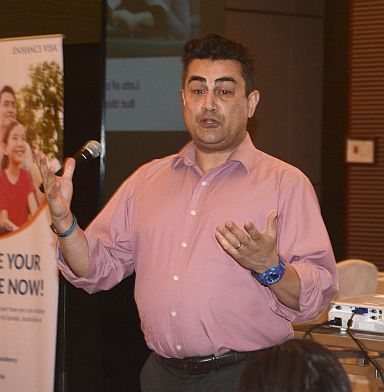
CANADA NURSING EXPO/JAN 30, 2017 Guest Speaker Tony Burke, vice president of OMNI College of Nursing in Vancouver, Canada. (CDN PHOTO/CHRISTIAN MANINGO)
AMID a brewing labor shortage in Canada, more Filipino nurses are encouraged to move and work there.
Tony Burke, vice president of the OMNI College of Nursing, said each Canadian province projects to open 2,000 to 4,000 nursing jobs in the next couple of years to address this shortage.
“The Canadian government has called the nursing shortage a crisis,” he said at the sidelines of the first Canada Nursing Expo in Cebu City last Saturday.
With the average age of 55 for Canadian nurses, which is also the country’s retirable age, Canada is most likely going to lose half of its nursing workforce to retirement in one to two years.
Burke said Canada’s aging population requires more nurses to take care of the elderly, but Canadian universities just can’t produce Canadian-trained nurses fast enough.
The Canadian Nurses Association (CNA) earlier predicted that Canada would be in need of at least 60,000 nurses by 2020 to fill the labor shortage.
He said the best and most effective way to address this gap is to hire internationally educated nurses such as those from the Philippines.
According to the Department of Labor and Employment (DOLE), the Philippines produces 200,000 nursing graduates annually, while there are only 2,500 available nursing jobs that await them.
Because of this surplus, many are forced to work abroad or stay in the Philippines but work in unrelated fields while waiting for a job vacancy.
However, other countries such as Canada do not recognize nursing education in the Philippines and, therefore, would imply that Filipino nurses in Canada are technically not nurses unless they acquire a Canadian nursing license.
Vancouver-based OMNI College of Nursing specializes in training internationally educated nurses in getting skills required to meet Canadian standards as well as language in preparation for the Canadian Nursing Licensure Exam.
Burke said the Philippines is OMNI’s second top market, neck and neck in terms of number with India; but what sets Filipino nurses apart from their Indian counterparts is the former’s ability to adjust wherever they go.
“Filipinos, anywhere they go, they make it and they’re successful. Filipino nurses and Indian nurses both have really good training and experience, but adapting is the biggest difference,” said Burke.

